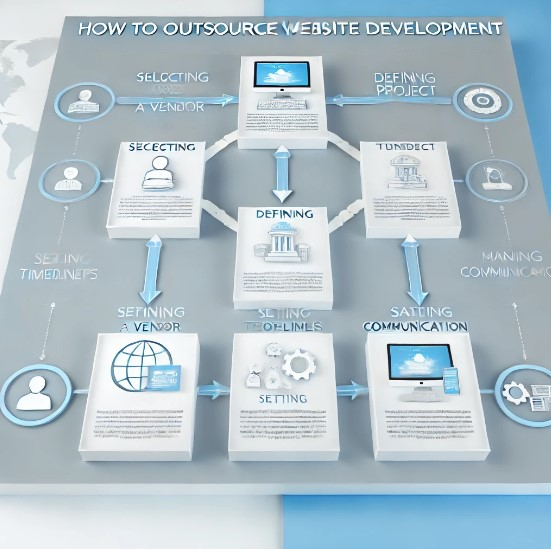How to Outsource Website Management in 2024
- Why Outsource Website Management
- How To Outsource Website Management
- What To Consider In A Website Management Provider
- How Much Does It Cost To Outsource Website Management?
- Outsourcing Can Keep Your Website Safe
- Outsourcing VS Outstaffing vs In-house Team
- Outsource Your Website Management with Hutko.dev Today
- Conclusion
In 2024, many businesses are choosing to outsource their website development. This is a way to stay competitive within the industry. Outsourcing helps manage the complexity of web projects. It provides access to skilled professionals without the high costs of building an in-house team.
In this article, our experts explain why outsourcing website management can be a smart choice. Hence, check out the outlines of its benefits and best practices. It will walk you through the steps to find and work with the right partner. We’ll highlight important factors to consider. By following these tips, businesses can improve their online work and still focus on their main goals.

Why Outsource Website Management
When a business makes a strategic choice to outsource web management, it gets lots of benefits. As a result, companies of all sizes opt for the solution. This is a simple way of making the online presence much stronger. Let’s get deeper into the reasons why outsourcing is your go-to.
To Save Costs
Outsource website management can lead to substantial cost savings. You get rid of hiring, training, and maintaining an in-house team. There’s no need to invest in permanent staff and associated overhead costs. Businesses pay only for the services they need when they need them. This flexible approach allows companies to better manage their budget. Managers allocate resources more effectively. There are no ongoing expenses for full-time employees. You don’t care for salaries, benefits, and office space. Focus on the core activities while controlling their overall operational costs.
To Get Access to Expertise
Outsourcing lets companies tap into specialized skills that they might not have in-house. Working with external experts provides immediate access to a team with deep knowledge and experience in web development. This means using the latest technologies and best practices without internal training or new hires. These external teams are skilled at handling complex projects. They solve tough problems, and bring high-quality results. By outsourcing, businesses can benefit from this expertise. They improve their web presence, stay competitive, and meet their development goals more effectively.
To Focus on Core Business
Outsourcing website management allows companies to focus on what they do best. When businesses delegate technical tasks to outside experts, they free up their own time and resources. This shift means that companies can direct their energy towards their main goals. They tend to core activities, such as growing their market presence or improving customer service. Experts handle technical details. The website runs smoothly and meets high standards. The external team takes care of the web development and maintenance tasks efficiently.
To Get Faster and More Efficient
Outsourcing often speeds up project timelines. Skilled teams can swiftly adapt to changes and deliver results faster. Businesses launch and update their websites more efficiently. This faster turnaround is crucial for staying competitive and responding to market demands. Here’s how outsourcing improves speed and efficiency:
- Quick Adaptation: Experienced teams adjust to project changes with minimal delays.
- Fast Delivery: Efficient processes lead to quicker completion of tasks.
- Rapid Updates: Updates and improvements are made promptly to keep the website current.
- Focused Expertise: Specialists use their skills to streamline development and problem-solving.
Benefits of Outsourcing Website Management
To be a little bit more convincing, we’ve put the pros of web development outsourcing in the table below.
| Benefit | Description |
| Access to Latest Technology | Companies often use the latest tools and technologies, which may not be available in-house. |
| Scalability | Allows businesses to scale their projects up or down easily based on needs. |
| Risk Management | Sharing development responsibilities with an outsourcing partner can spread and manage risks more effectively. |
| Global Perspective | Provides a global viewpoint, which can enhance website design and functionality. |
| 24/7 Support | Many outsourcing firms offer round-the-clock support. This continuous website maintenance and troubleshooting. |
How To Outsource Website Management
Use these steps to make the web development outsourcing more productive and successful.
Focus on Your Needs
Start by figuring out exactly what tasks you want to outsource for your website.
Identify Specific Tasks: Determine the exact duties you want to outsource, such as:
- Routine updates
- Bug fixes
- Content management
- Technical support.
Create a Detailed List: Write down all the tasks and responsibilities needed. This helps you be clear about what you need. When you know what you want, you can explain it better to the companies you are thinking about working with.
Clarify Your Requirements: Ensure you understand what needs to be done to communicate effectively.
Prepare for Providers: Use this clear list to explain your needs to potential outsourcing companies.
Choose Partners
Find outsourcing companies with a solid history in web site management. Look at their reviews and reputation to see if they are trusted in your industry. Check their expertise. They have to be skilled in the type of web site management you need. If you need ecommerce website maintenance, this has to be their primary skill. Reliable partners will have a proven track record of completing successful projects. There has to be some positive feedback from past clients. Take time to read detailed reviews and case studies to confirm their abilities. A strong history of client satisfaction and project success is key to choosing the right partner for your website management.
Review the portfolios of potential outsourcing partners. Assess their experience and capabilities. Request references and contact previous clients to gain insights into their reliability, work quality, and customer service.
Conduct Interviews and Finalize Contract Terms
Let’s go through the first communication processes.
- Begin by interviewing potential partners to discuss your project in detail.
- Evaluate their understanding of your needs, their communication skills, and their ability to meet deadlines. This step is crucial to ensure the partner is a good fit for your business.
- Once you select a partner, move on to negotiating and finalizing the contract terms. This contract should clearly outline the scope of work, deliverables, deadlines, payment terms, and confidentiality agreements.
- Make sure every aspect of the agreement is clear and agreed upon by both parties. Avoid misunderstandings for a smooth collaboration.
Organize the Transition
Create a clear plan to hand over responsibilities to your outsourcing partner smoothly. This plan should include several key steps:
- Access to Systems: Make sure the partner has the necessary access to your existing systems and tools. Provide any login details or permissions they need to start working.
- Training: Offer training to help the partner understand your specific needs and how your systems work. This might include detailed explanations of processes and any special requirements.
- Initial Meetings: Set up initial meetings to discuss the project milestones and goals. Use these meetings to go over the project plan, address any questions, and ensure everyone is on the same page.
- Documentation: Provide any important documents, guides, or manuals. They will help the partner perform their tasks effectively.
You can make the transition as smooth as possible. Make your partner well-prepared to take on the responsibilities.
Set Up Communication Rules
Create clear rules for how you and your outsourcing partner will communicate. Decide how often updates will be given. Choose which methods of communication (like email or chat) will be used. Allocate who the main contacts will be. Good communication helps keep the project on track and makes sure everyone works well together.
Check and Review Performance
Keep an eye on how well the partner is doing their job. Check if they meet deadlines, maintain good quality, and respond quickly. Give feedback and fix any problems as soon as they come up. This helps the project stay on track and meet your needs.
What To Consider In A Website Management Provider
When choosing a web site management provider, it’s important to evaluate several key factors. They will ensure you get the best service for your needs:
- Experience and Expertise: Look for a provider with a strong track record in web site management. Check their experience with websites similar to yours. See their ability to handle the specific requirements of your site.
- Reputation and Reviews: Read client reviews and testimonials to gauge the provider’s reliability and quality of work. Read several outsourcing case studies to get deeper into the work. A good reputation is often a sign of a trustworthy partner.
- Service Offerings: Ensure the provider offers the specific services you need. Look for routine maintenance, content updates, technical support, and security management.
- Communication and Responsiveness: Assess how effectively the provider communicates and how quickly they respond to inquiries. Good communication is key for smooth collaboration.
- Pricing and Contracts: Review their pricing structure and contract terms. They must align with your budget and expectations. Look for transparency in costs and clear terms for services provided.
- Technical Skills: Verify the provider’s technical skills. They should know the platforms and technologies used for your web site. The team should be able to manage and troubleshoot any technical issues that arise.
- Support and Maintenance: Check what kind of ongoing support and maintenance are included. Regular updates and quick resolution of issues are crucial for maintaining website performance.
- Security Measures: The provider must have robust security measures in place to protect your web site from threats and vulnerabilities.
How Much Does It Cost To Outsource Website Management?
Understanding the cost to outsource IT services is crucial for budgeting and planning. It can offer significant savings and efficiency benefits. Still, costs vary widely based on several factors. These include the complexity of the website, the level of service required, and the expertise of the outsourcing provider.

See the typical costs associated with website management outsourcing. This will provide insights to help you choose the best option for your needs.
| Type of Website | Monthly Maintenance Cost |
| Personal Website | $5 to $25 |
| Professional Blog | $25 to $75 |
| Small Business Website | $35 to $100 |
| SMB Business Website | $125 to $500 |
| Corporate Website | $200 to $3500 |
| Web Application | $300 to $2500 |
| Custom Business Website | $350 to $4500 |
| Ecommerce Website | $1500 to $2500 |
| Custom Ecommerce Website | $2000 to $5000 |
Outsourcing Can Keep Your Website Safe
Outsource website management helps keep your site secure. Experts have the skills and tools needed to protect your site from online threats. They use the latest security methods, regularly check for weaknesses, and apply updates quickly to defend against attacks. By letting these experts handle your site’s safety, you get top-notch protection. It might be expensive or hard to manage on your own. This helps prevent security problems and ensures your site meets industry rules. You focus on running your business without worrying about website safety.
Benefits of Outsourcing for Website Safety:
- Expert Protection: Skilled professionals use advanced security methods.
- Regular Monitoring: Continuous checks for weaknesses and threats.
- Quick Updates: Fast application of security patches and updates.
Outsourcing VS Outstaffing vs In-house Team
Check out the three main models for website development: Outsourcing, Outstaffing, and In-house Teams. Each approach has its own set of advantages and disadvantages. Every one can impact your project’s success and budget. Knowing these differences can help you choose the best option. It has to be based on your specific needs, goals, and resources. Here’s a detailed look at what each model offers and the potential challenges associated with them:
| Model | Advantages | Disadvantages |
| Outsourcing | – More cost-effective than in-house development- Access to a fully staffed team- Experts with specialized skills- Streamlined development processes- Fast project initiation- Suitable for new project development | – Less control over the development process- Limited transparency- Challenges with remote collaboration- Risk of exposing sensitive information |
| Outstaffing | – Most cost-efficient option- Full-time availability of the team- Flexible recruitment- Quick project start | – Communication challenges- Needs extra management- Risk of exposing sensitive information |
| In-house Team | – Strong security for sensitive data- Effective communication- Complete control over development- Best for long-term projects | – High costs- Lengthy hiring process- Slow to start- Less effective for short-term projects |
Outsource Your Website Management with Hutko.dev Today
Choosing the right outsourced development team will make a difference in the success of your project. Our team stands out for its extensive experience and proven track record. It includes delivering high-quality solutions on time and within budget. We offer a well-organized development process. You get communication and transparency throughout the project. With a dedicated focus on understanding your specific needs, our experts provide solutions that align with your business goals. By partnering with us, you benefit from cost-effective, efficient, and reliable development services. You concentrate on growing your business while we handle the technical details.
Conclusion
Outsource website management can be a powerful strategy for businesses. It makes their online presence stronger. They optimize costs and resources. Companies can benefit from expertise, efficiency, and scalability. Embrace the right approach to website management. Your business will stay competitive and focused on the core objectives. Leave technical challenges in the hands of trusted experts.

Free website strategy session with a senior web expert
For over a decade, we’ve helped startups, SaaS companies, and service brands build high-performing websites that drive real results. Whether you’re planning a redesign, launching a new product, or need to scale your platform—our technical and UX expertise can help you move faster and smarter.
Ready to talk? Connect with a lead developer at Hutko.dev for a FREE 30-minute strategy call. Let’s map out your next step, together.
Book a Free Call





